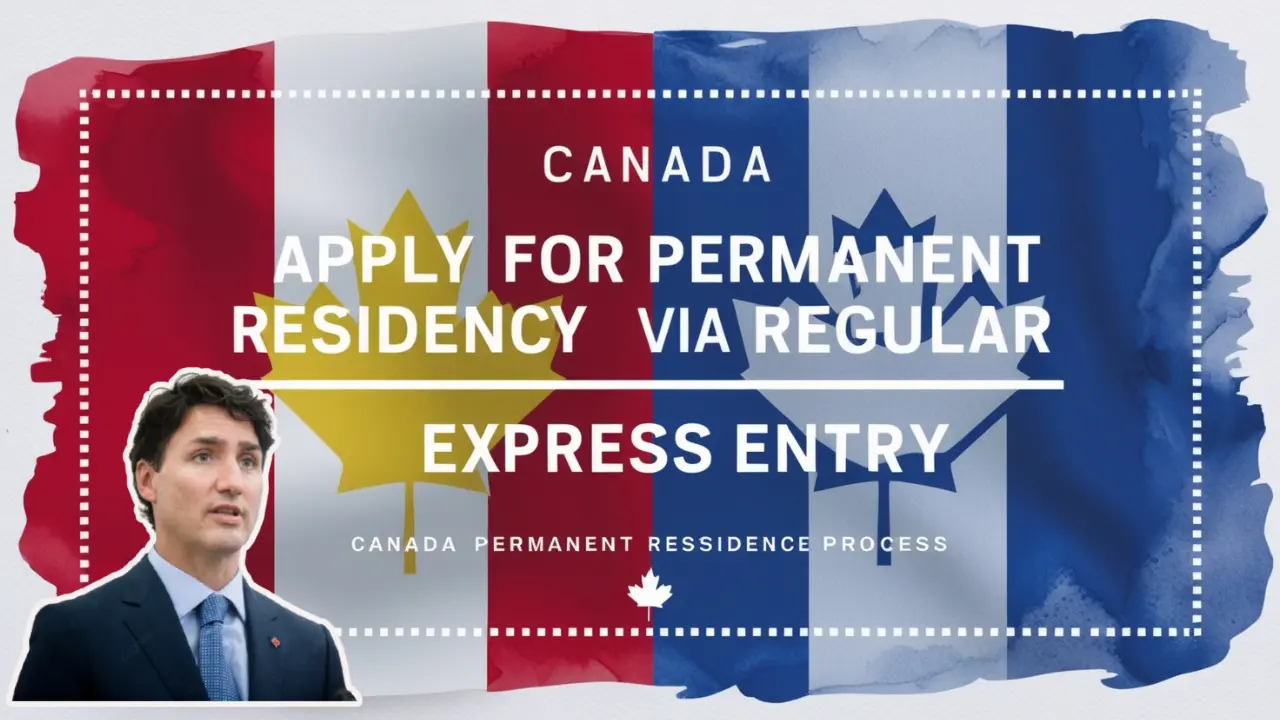Canada Permanent Residence: Apply for Permanent Residency via Regular Express Entry
Canada’s Express Entry system is one of the most efficient and popular immigration pathways for skilled workers seeking to become permanent residents of Canada. This article provides an in-depth guide on the eligibility criteria, step-by-step application process, and valuable tips to improve your Comprehensive Ranking System (CRS) score for a successful application.
Canada Permanent Residence
Canada’s Express Entry system has become one of the top routes for skilled workers from around the world to obtain permanent residency. Since its introduction, it has streamlined the immigration process, making it easier and quicker for eligible candidates to settle in Canada. In this guide, we’ll explore how Express Entry works, the eligibility criteria, how to apply, and key tips to enhance your chances of being selected.
Overview of Express Entry
The Express Entry system is Canada’s online application management system for skilled worker immigration. It evaluates candidates based on the CRS, a points-based system that ranks individuals according to their qualifications. The highest-ranking candidates are then invited to apply for permanent residency.
Express Entry manages applications for three key immigration programs:
- Federal Skilled Worker Program (FSWP)
- Federal Skilled Trades Program (FSTP)
- Canadian Experience Class (CEC)
Additionally, some provinces nominate candidates through the Provincial Nominee Program (PNP), offering additional points to enhance a candidate’s CRS score.
Eligibility Criteria
To be eligible for Express Entry, candidates must meet the specific criteria for one of the following programs:
Federal Skilled Worker Program (FSWP)
- Work Experience: At least one year of continuous, paid work in a skilled occupation.
- Language Proficiency: A minimum Canadian Language Benchmark (CLB) of 7 in English or French.
- Education: A Canadian high school diploma or its equivalent.
- Points Requirement: You need to score at least 67 out of 100 based on factors such as age, education, work experience, and adaptability.
Federal Skilled Trades Program (FSTP)
- Work Experience: Two years of full-time experience in a skilled trade.
- Language Proficiency: CLB 5 in speaking and listening; CLB 4 in reading and writing.
- Job Offer/Certification: A valid job offer or a trade certificate from a Canadian authority.
Canadian Experience Class (CEC)
- Work Experience: At least one year of skilled work experience in Canada.
- Language Proficiency: CLB 7 for NOC 0 or A jobs, and CLB 5 for NOC B jobs.
Step-by-Step Guide to Applying for Canada Permanent Residency
- Check Eligibility
Use the “Come to Canada” tool to assess your eligibility for Express Entry. - Gather Necessary Documents
You’ll need the following:- Language Test Results (IELTS, CELPIP, TEF, or TCF).
- Educational Credential Assessment (ECA) if you completed your education outside Canada.
- Proof of Funds to demonstrate that you have sufficient financial resources (unless applying through the Canadian Experience Class or with a job offer).
- Create Your Express Entry Profile
Complete your profile on the IRCC portal with details about your qualifications, work experience, and language proficiency. - Obtain Your CRS Score
Your profile is ranked using the CRS based on factors like age, education, work experience, and language skills. - Enter the Candidate Pool
Eligible candidates are placed into the Express Entry pool and ranked against others. - Receive an Invitation to Apply (ITA)
The IRCC holds periodic draws, selecting top-ranked candidates to apply for permanent residency. - Submit Your Application
Once you receive an ITA, you have 60 days to submit your complete application, along with supporting documents. - Processing and Approval
After submission, applications are typically processed within six months. If approved, you will receive a Confirmation of Permanent Residence (COPR) and can begin your new life in Canada.
Understanding the Comprehensive Ranking System (CRS)
The CRS assigns points to candidates based on various factors, including:
- Core Human Capital Factors: Age, language proficiency, education, and Canadian work experience.
- Spouse/Common-Law Partner Factors: Points for your partner’s qualifications and experience.
- Skill Transferability Factors: Combination of education, language skills, and Canadian work experience.
- Additional Points: Provincial nominations, valid job offers, and siblings in Canada can add extra points.
Example CRS Calculation:
- Age: 29 years (110 points)
- Language: High English proficiency (128 points)
- Education: Bachelor’s degree (112 points)
- Work Experience: Three years (50 points)
- Provincial Nomination: 600 points
Total CRS Score: 1,000 points
Provincial Nominee Program (PNP)
Some Canadian provinces and territories invite candidates directly from the Express Entry pool to apply for provincial nomination. A provincial nomination adds 600 points to your CRS score, significantly improving your chances of receiving an ITA.
Popular PNPs include:
- Ontario Immigrant Nominee Program (OINP)
- British Columbia Provincial Nominee Program (BC PNP)
- Alberta Immigrant Nominee Program (AINP)
Common Challenges and Tips for Success
- Language Proficiency: If you have trouble meeting the language requirements, consider additional language classes or re-taking the language tests to improve your score.
- CRS Score Below the Cut-off: If your CRS score is too low, you can boost it by improving your language scores, gaining more work experience, or applying through a PNP.
- Proof of Funds: Make sure to have adequate funds documented, especially if you’re applying through FSWP or FSTP, as they require proof that you can support yourself and your family in Canada.
Tips to Improve Your CRS Score
- Enhance Language Skills: Retaking your language test and improving your score can significantly raise your CRS points.
- Gain More Work Experience: Additional years of work experience can increase your score.
- Secure a Job Offer: A valid job offer from a Canadian employer can add up to 200 points to your CRS score.
- Obtain a Provincial Nomination: A provincial nomination adds a massive 600 points to your CRS score, often securing an ITA.
- Pursue Higher Education: Completing a higher degree can add valuable points to your profile.
Life After Receiving Permanent Residency
Once you are granted permanent residency in Canada, you gain access to a host of benefits:
- Healthcare: You can access Canada’s public healthcare system.
- Employment Rights: Work in most job positions without restriction.
- Education: Your children will be eligible for Canada’s free public education system.
- Social Benefits: You may qualify for social assistance programs such as pensions and employment insurance.
Upon arrival, you’ll need to complete a few steps, such as applying for a Social Insurance Number (SIN) and registering for healthcare.
Keep Your Profile Updated
Make sure to update your Express Entry profile whenever there are changes in your:
- Marital Status: This can affect your CRS score.
- Education or Work Experience: Adding new qualifications or job experiences can boost your points.
- Language Test Scores: A higher score will improve your ranking in the Express Entry pool.



